
 |
||||
|---|---|---|---|---|
| Volume 50 Number 34, September 5, 2020 | ARCHIVE | HOME | JBCENTRE | SUBSCRIBE |
Workers' Weekly Internet Edition: Article Index : ShareThis
The Fight for Safe School Reopening:
While Schools Leaders Continue to Deliver, Westminster Continues to Fail ThemHealth Workers Pay Inequality Day of Action:
Support the NHS Say No! to Pay Inequality Day of ActionGovernment Abolishes Public Health England:
Concerns about Latest Developments after the Abolition of Public Health EnglandWorkers' Forum:
RMT Engineers Step Up for the Fight on London UndergroundWorkers' Forum Discussion:
Challenge of Workers Organising to Guarantee their RightsDefending the Rights of All:
Addressing Plight of Families with NRPF through Covid-19 CrisisUse of State-Backed Racist Militias in the United States:
Resistance Persists against State-Organised Attempts to Undermine Movement for ChangeDemocratic People's Republic of Korea:
72nd Anniversary of the Founding of the Democratic People's Republic of Korea
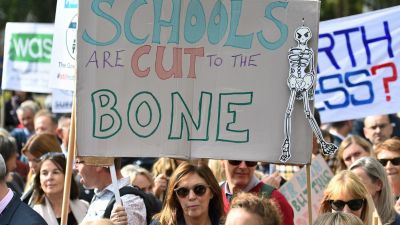
Scotland's schools went back in August, while all schools in England and Wales will have been expected to return this first week in September. The government issued an eleventh-hour edict to schools on how to plan for local lockdowns, angering headteachers and prompting questions about resources. For example, the guidance also calls for increased cleaning in schools that operate rota systems, prompting calls for assistance in meeting costs.
The guidance set out four "tiers" of action that may be needed, depending on the level of government intervention in different areas of the country. The new guidance was issued shortly after 7pm on Friday, August 28, despite the fact many schools were ready to welcome pupils back the very next week and some had already begun their new terms.
Paul Whiteman, general secretary of the National Association of Headteachers, called the decision to publish so late on a Friday "nothing short of reprehensible".
"It demonstrates a complete lack of regard for the well-being of school leaders and their teams," he said in an email to members. "The decision confirms the government simply does not understand the commitment and professionalism of school leaders who will feel compelled to act immediately." However, he said that having gone through the guidance, NAHT felt it was "unlikely" that members will need to take "urgent action over the weekend".
"With all schools currently deemed to be at what the government is calling 'tier one' (open to all pupils), there is no immediate rush to abandon your bank holiday plans. After all, you have worked throughout the pandemic and a great deal of the summer."
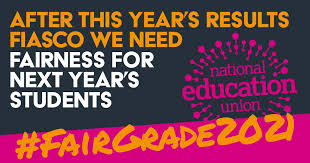
The government's actions or its inaction have angered heads, teaching staff and support staff alike. It was reported that, for instance, in June school leaders had had to read almost 100 updates to government guidance during the pandemic.
Geoff Barton, general secretary of the ASCL leadership union, said: "We've been calling for more contingency planning from the government in the event of local lockdowns, so we are pleased that it has finally published some guidance to this effect.
"But to wait until the Friday night before most schools return isn't the government's finest moment. Obviously, schools haven't had any chance whatsoever to incorporate this into their planning and will now have to revisit the plans they have put in place."
Dr Patrick Roach, general secretary of the NASUWT teaching union, said it was "regrettable" that the government had published more guidance at such a late hour, and that his union had been asking for clarity "for some time".
"There must be a recognition that whilst children will be affected by local restrictions, so too will teachers and other staff in schools. The availability of staff where there is a local lockdown or outbreak may mean that schools have to limit provision if they cannot be staffed safely," he said.
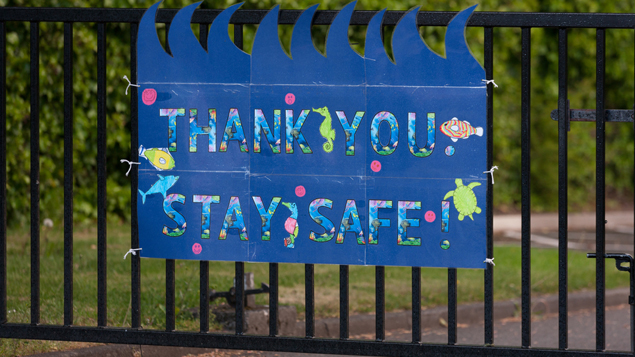
"The government now needs to confirm that schools will have the additional resources they need to deliver an effective remote learning offer to all pupils as well as funding for additional staff that will be necessary to maintain continuity of provision in the event of local disruption."
Through the course of the pandemic the government has been refusing to engage with teachers and their unions. It has spun education guidance out of thin air, negating the human factor involved in education, and thus based on a crass lack of familiarity with the sector, an absence of concern for the individual child, and an indifference towards those from disadvantaged backgrounds. Government decisions have exposed a huge gap between guidance and the reality of life in schools, The incoherence of the government's actions contrast with the commitment teachers have shown to supporting their schools, their pupils and their communities, often very quickly and without appropriate advice from government.
The refusal of governments to put the well-being of students, education personnel and parents as the guiding principle of their actions is putting tremendous pressure on their physical and mental health. Now teachers and education workers are going through the most stressful conditions as they attempt to guarantee the safety of students, parents and staff, as well as teach their pupils.
We salute the teachers and support workers when the system is failing them, and they themselves take up their social responsibility against all the odds. What they are finding is that their collective and sympathetic approach to resolving the problems is strengthening their resolve to ensure that the future direction of education is human-centred, serving pupils, staff and society as a whole. Their authority lies in their determination to speak in their own name as part of fighting in defence of the rights of all.
Experience with lack of resources
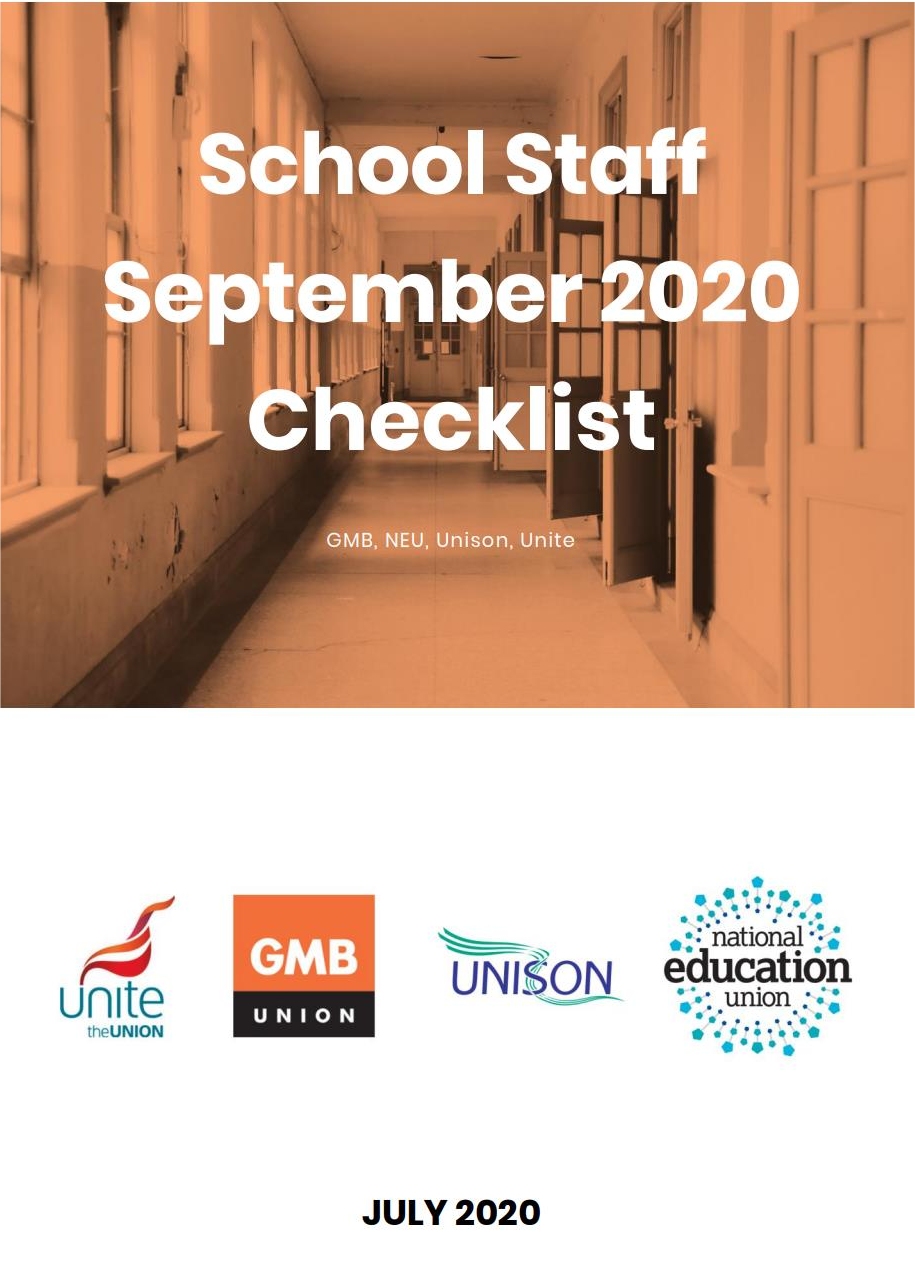
According to personal experience of a head teacher, reported in Schools Week, Devon schools have been poorly funded for more than a decade. The head teacher writes:
"We come near the bottom for per-pupil funding. And my school has been in deficit for several years. We've made staff redundancies and many other sacrifices to reduce that deficit. My local authority told me this year I had to have at least £5 in the black. For this financial year, we finally managed to produce a budget that would remove us from an end of year deficit - just. Then we entered lockdown.
"The school immediately lost the income that it generates through letting the hall for a dance club and fitness classes, to the tune of about £2,000 so far. At the same time, the budget for cleaning staff and materials began to spiral.
"The increase in hours worked by cleaners and extra cleaning materials has cost us £5,000 more so far. With the loss of income, this means at least £7,000 less than anticipated at the beginning of the financial year. As the budget is so finely balanced, a few thousand pounds of extra spending and loss of income puts us straight back into a deficit. It's therefore just another astonishing turn from this government, following a summer of late and confusing decisions, to hear they think that schools can cope with this extra cost. How can this be right?
"When budgets were planned, we had no idea how much would need to be spent making the school safe. Certainly in the case of my school, we can't afford it. I am now forced to look at where I can make 'savings'. Trips and visits are under review, which are so important for primary school pupils in terms of cultural capital. About 35 per cent of our pupils are from socio-economically disadvantaged families. That's not to mention all the additional interventions we want to put in place to close the learning gap that has widened during lockdown. Perhaps the new phonetically decodable reading books we were going to purchase will have to wait.
"That's a deep shame, as the children returning to us need help to get back on track with their learning. Meanwhile, I have a friend running a school in an area hit by a local lockdown whose school bill for Covid-19 measures is now £55,000. They lead a bigger school than me - yet the thought of having to find tens of thousands of pounds if there is a local outbreak leaves me in despair."
(Sources: School Week, teaching unions)
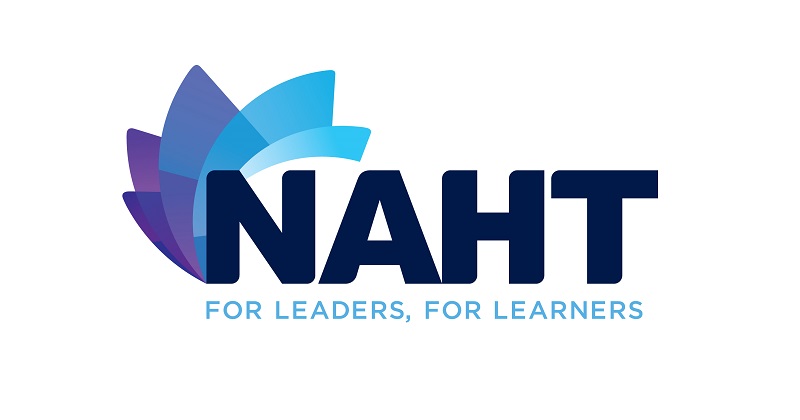
Writing on August 29, Paul Whiteman, general secretary of the National Association of Head Teachers (NAHT) was able to report that 97% of schools were expected to open in full to all pupils the following week and that the rest will follow shortly after.
He writes that, despite the delays, U-turns and chaos across UK governments, school leaders and their teams have stuck to their task, calmly, professionally and with good grace under fire. Parents can have confidence that schools will be ready, he says. School leaders have delivered, as they have done right through this pandemic.
Reviewing the last few months, he writes: "In March, the government decided to close schools for all but the children of key workers and the most vulnerable. This was the right decision but the support and advice to schools to make this happen was woeful. Yet school leaders still managed to make that transition safely.
"At the same time, schools worked without clear advice on the curriculum to make sure that education still continued, albeit at home, with minimal disruption and maximum impact. The government's response was to allow a few ill-informed but noisy commentators to lament schools' efforts, with a narrow-minded assumption that every child had easy access to the internet, a device of their own to use and a quiet spot in the house to study. Far too many children don't have any of these things, and in any case, education is a people business. Home study cannot replicate the energy and effectiveness of classroom learning.
"As lockdown wore on, and more and more families felt the squeeze, schools stepped in and fed the most in need whilst the government voucher scheme crashed due to the demand.
"The government cancelled exams and instituted a standardisation algorithm that prioritised 'the system' ahead of individual students. When the impact became clear, Westminster stood rooted like a rabbit in the headlights for several days, before settling on a solution that had always been there - employing the professionalism, dedication and hard work of teachers to accurately assess their students' abilities."
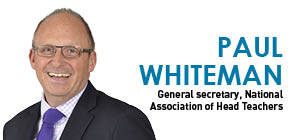
Paul Whiteman, general secretary of the National
Association of Head Teachers
Paul Whiteman writes of the government's record: "Throughout the pandemic we have seen multiple and repeated failures to properly engage with the professionals to accurately forecast the obvious problems and to use their expertise and knowledge to find innovative and precedent-breaking solutions.
"We are starting the new term not with a clear plan for the next academic year but more last-minute and insufficient guidance, this time for how to deal with local or national spikes in infection - something unions and sector bodies have been requesting since reopening was first touted.
"While the political circus continues, everything has rested on the shoulders of school leaders and their teams. For their part, they are very confident that they have put in place all the measures that they can in order to make next week a success, but concerns remain about issues outside the school gates.
"Only about 7 per cent of school leaders are confident in the current arrangements for tracking and tracing Covid-19 carriers. Only 18 per cent are confident in the arrangements for a lockdown in their area.
"Make no mistake, the return to school is a complex operation. The best laid plans will be sternly tested when they come into contact with the real world in the coming weeks. Schools have done what they can. If the R rate increases, it would be entirely wrong to lay any blame for that at their doors."
Paul Whiteman writes that although civil servants have been blamed for recent failings and removed from their posts, this must not happen to educators. He says: "School leaders and their teams will not stand for any blame-shifting if problems arise. Unfair criticism and scapegoating already means that too many leave prematurely and too few are attracted to the profession, let alone leadership within it."
Paul Whiteman concludes that, to their great credit, school leaders and their teams have not been distracted from their duty to the children in their care.
This is clearly the case. Education unions, in consultation with their members, schools, parents and the wider community, have acted responsibly and with genuine authority. Their interest has been, and is, in guaranteeing the well-being of everyone in society. It is imperative that this proactive approach of education workers continues and is built upon.
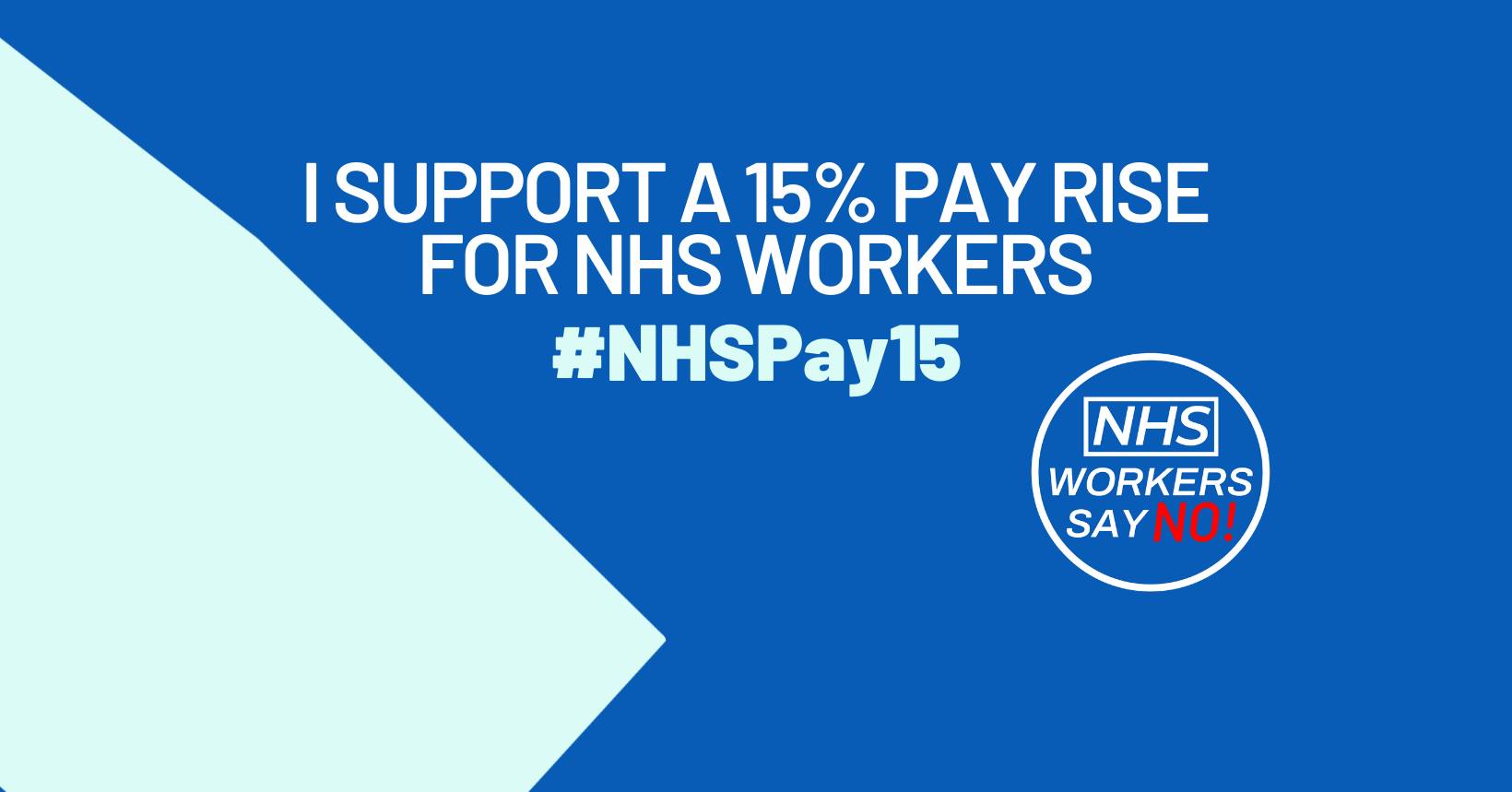
On August 8, around 40 protests were organised across England, Scotland and Wales as NHS workers were on the march to defend their dignity and to speak out loud and clear that public sector pay inequality is not acceptable. The central demand is for an immediate 15% increase in the level of pay that has been kept suppressed for a decade. It is clear that the whole future direction of the NHS is at stake, and there must be no return to the so-called "business as usual". [1]
On Saturday, September 12, from 11.00 am to 2.00 pm, there will again be demonstrations and rallies in many towns and cities. [2]
Nurses and other health workers are speaking in their own name and taking up the fight, both to improve their own pay, and at the same time to take part in the struggle to safeguard the future of the NHS and care services.
1. See: http://www.rcpbml.org.uk/wwie-20/ww20-30/ww20-30-01.htm
2. For full list see: https://keepournhspublic.com/event/day-of-action-nhs-workers-say-no-to-pay-inequality-2/
Following the abolition of Public Health England [1], we are reproducing below a press release from councillors in the North East of England.
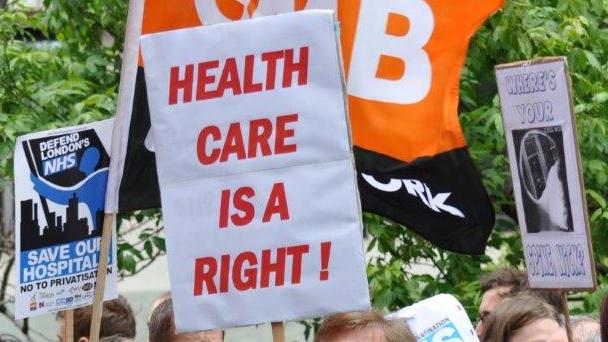
Health and Wellbeing Board Chairs from across the region have come together to express concern at the Government's decision to restructure Public Health England and to hand over key responsibilities to a new body with no clear idea of what it will do or how it will be governed.
"The National Institute for Health Protection appears to be an organisation set outside of the NHS but with a crucial role to play in the health of our communities," said Cllr Lynne Caffrey, Chair of the Gateshead Health and Wellbeing Board (HWB), who coordinated a letter to both the Prime Minister and the Secretary of State for Health, Matt Hancock.
The letter from 10 of the region's 12 HWB Chairs from across political parties, expressed their surprise at the changes being proposed in the middle of a pandemic.
It also asks for the expertise of local councils in dealing with many aspects of public health, including infectious disease outbreaks, to be recognised and for any new structures or systems to be set up to be co-designed with local authorities.
Cllr Caffrey, said: "We believe we need to focus on maintaining the local capability, capacity and skills, to keep the effective working relationships already established and for us to have a system in place that is best able to protect the communities we represent."
This view is shared by Directors of Public Health (DsPH) across the region and, as leaders of local systems they have experienced at first-hand the vital role that regional Public Health England (PHE) teams play in protecting the health and wellbeing of local communities and that they do not wish to lose this regional expertise.
Amanda Healy, Durham's Director of Public Health and chair of the North East Association of Directors of Public Health, said: "Our regional PHE colleagues have played a critical role in our local response to Covid-19. As such, any proposal to dismantle these arrangements now, particularly ahead of winter, present a real risk to protecting the health and wellbeing of our community.
"It is also vital that people understand the breadth of remit that PHE has across healthcare public health, health improvement and health inequalities. We would strongly recommend that any restructuring protects these functions which have a central role across Local Government and the NHS.
"We have all been involved with many re-organisations over the years and while, at times, there have been benefits, we also understand the immense upheaval and disruption they create. Given the pressure we are all currently under we, as Directors of Public Health across the North East, are extremely concerned that this disruption may adversely affect our ability to protect our communities from Covid and indeed other infectious diseases as we come towards the winter months."
Note:
1. See "Government Abolishes Public Health England": http://www.rcpbml.org.uk/wwie-20/ww20-32/ww20-32-05.htm
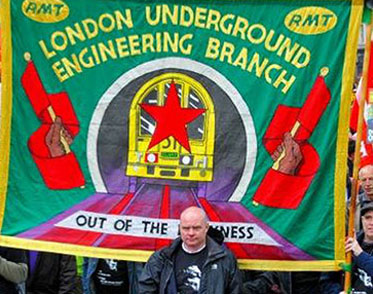
On August 27, the RMT's London Regional Council debated and voted unanimously to support a motion from the RMT's Engineering branch about the crisis workers on London Underground face, and the way forward.
RMT has stated that "since 2013, £7bn of cuts have been imposed onto TfL and the tube by central government and the London Mayor... The Covid-19 pandemic has brought TfL funding to a crisis point even before we had expected."
The engineers' motion reads:
"LU Engineering Branch and the London Transport Regional Council note the disastrous effect of the Coronavirus pandemic on the tube due in large part to the unpreparedness of the British Government, DfT, TfL and London Underground.
"Apart from the threat to the lives of transport workers and passengers, the company's collective ineptness has plunged London Underground into deep financial crisis leading to the London Mayor and his TfL Team negotiating an operational loan from the government with such derisory terms that any negotiator worth their salt would be totally ashamed of themselves.
"Among the government's terms for the loan, the notorious auditing consultants and hatchet-men KPMG are now reviewing the finances of London Underground under instruction to finalise their report and recommendations by the end of August - this month.
"This branch and regional council call on the RMT NEC to instruct the General Secretary to write to London Underground without any delay demanding:
" * An unambiguous written confirmation within 14 days that the company will abide by the health & safety principles contained in the RMT London Underground Covid-19 Charter.
" * An unambiguous written confirmation within 14 days that the company will not make any changes to members terms and conditions of employment, Framework Agreements or any other agreements negotiated at any level of the LU Machinery of Negotiation and Consultation or the LU Health and Safety Machinery without the express agreement of this union.
"The NEC is to Instruct the General Secretary that if no adequate replies are received from London Underground within the allotted 14 days; the General Secretary is to inform the company that a dispute exists between this union and London Underground, and without any delay to commence a ballot of all members on London Underground for strike action and if deemed appropriate upon consultation with LU branches a ballot for industrial action short of a strike."
(Unjum Mirza, Counterfire)
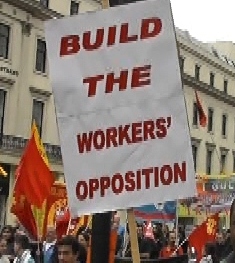
Many essential workers and those told to return after furlough have needed to take issue with employers who have continued to force workers to work under poor conditions, without personal protection equipment (PPE), social distancing, inadequate ventilation and many more long held problems in the working environment. This has been seen where there are spikes in the coronavirus infection rates such as care homes, food processing and packaging factories.
Many car companies now employ a portion of their workforce from an agency pool. This is the situation at BMW in Oxford [1] and Tata Jaguar in Castle Bromwich, Birmingham, for example. The large industrial employers reason that these workers are easier to hire and fire as a reserve workforce, even though skills may be lost in the process and employers may need to retrain workers for the various tasks for the future. These temporary workers suffer poorer conditions than full time workers with contracts of employment. Many temporary workers across industry work in the "gig" economy, on basic minimum wage or below. Workers are not at all happy about this situation. Some work in Victorian conditions like sweatshops. Some are migrant workers or are unregistered. Advantage is taken of these workers by big companies like Boohoo in the clothing industry, but employment agencies have been known to supply workers across the board as low paid exploited labour.
It is precisely because aims and interests are in conflict that the conditions of workers and their concerns are not being addressed by these monopolies and multinationals. They do not feature on the list of elite priorities. Workers must organise to force the issues onto the agenda. They can mobilise the full weight of their organisation to defend and resist this anti-social offensive. Workers' councils still exist at Castle Bromwich, for example. Trades councils and other collectives are holding online meetings. Often workers are in fact discussing how to set their own agenda and what agenda to set.

The pandemic has brought into sharp relief the injustices and inequality in society. The government, the mouthpiece of the rich and the financial oligarchy, is set to continue the status quo and even worsen these injustices under the guise of "protecting the economy". So on the one hand, while claiming to have the safety of workers uppermost in their minds, the government and its backers preside over a return to work while at the same time hundreds of thousands are losing their jobs and the chancellor says "we can't save all jobs".
Workers have been striving to enhance their decision-making over their conditions and the production process in its entirety. They are not accepting the pretext that because of the effects of the Covid-19 pandemic workers have to face redundancy.
Workers across the car industry and the economy as a whole are faced, particularly at this time, with the need to limit the power of the monopolies to impose their dictate. Powerful private interests are using the conditions of the pandemic to block the workers from asserting their own rights and interests. People's lives and livelihoods are treated as just so much collateral damage.
Workers' voices speaking out about their conditions and the solutions to the problems that production faces must be heard. This is the nub of the matter, and it is no small matter.
The workers' security lies in our fight for the rights of all!
Note
1. See "BMW Announces Hundreds of Agency Job Losses": http://www.rcpbml.org.uk/wwie-20/ww20-33/ww20-33-02.htm
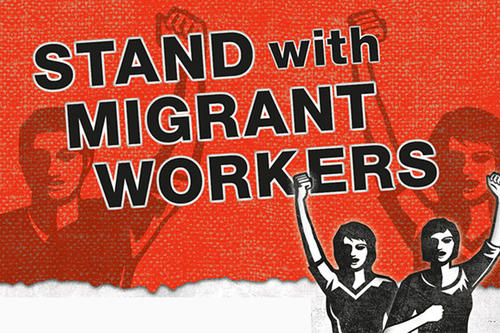
The Immigration Act brought in under Theresa May's government and the so-called "hostile environment" policies that were consolidated by her continue to have a detrimental effect on migrant communities and their ability to access housing, jobs, healthcare and welfare support in Britain. The Covid-19 pandemic has added to this by impacting both individuals and families, with some losing vital hhousehold income due to the loss of employment or being furloughed as their employment is not conducive to working remotely. This has especially impacted on those families whose right to claim benefits is blocked through NRPF (No Recourse to Public Funds) and are at risk of contracting or spreading the virus due to working conditions, or who alternatively face destitution.
A briefing by the Migrant Rights Network (MRN) explains:
"People with No Recourse to Public Funds attached to their visas are particularly vulnerable because:
Undocumented children and their parents are at even greater risk, MRN points out. Mayor of London research estimates that 100,000 live in London, many staying with friends or working informally. Their safety is even more limited.
MRN says: "Migrant communities are also extremely diverse and support services cannot offer blanket advice without understanding the individuals and their communities. It is extremely difficult to navigate the current immigration system and access support services from organisations that understand your particular set of circumstances, be it language, physical, mental, religious/cultural barriers."
The Migrant Rights Network is working in partnership with RAMFEL and Olmec to help support these diverse and vulnerable communities by offering immigration, employment and mental health and well-being advice and support. RAMFEL (Refugee & Migrant Forum of Essex and London) is a charity that supports vulnerable migrants to access justice and that provides vital support in moments of individual crisis. Olmec is a BME-led Social Enterprise which champions race equality through economic and social justice.
MRN also aims to help migrants affirm their rights and to assert them in eight key areas of everyday life: banking, driving, education, employment, health, housing, social services, and detention and deportation and also how to advocate for themselves.
It is unconscionable that migrants, as human beings, should have their rights denied. The rights of all must be defended, and the rights of migrants respected.
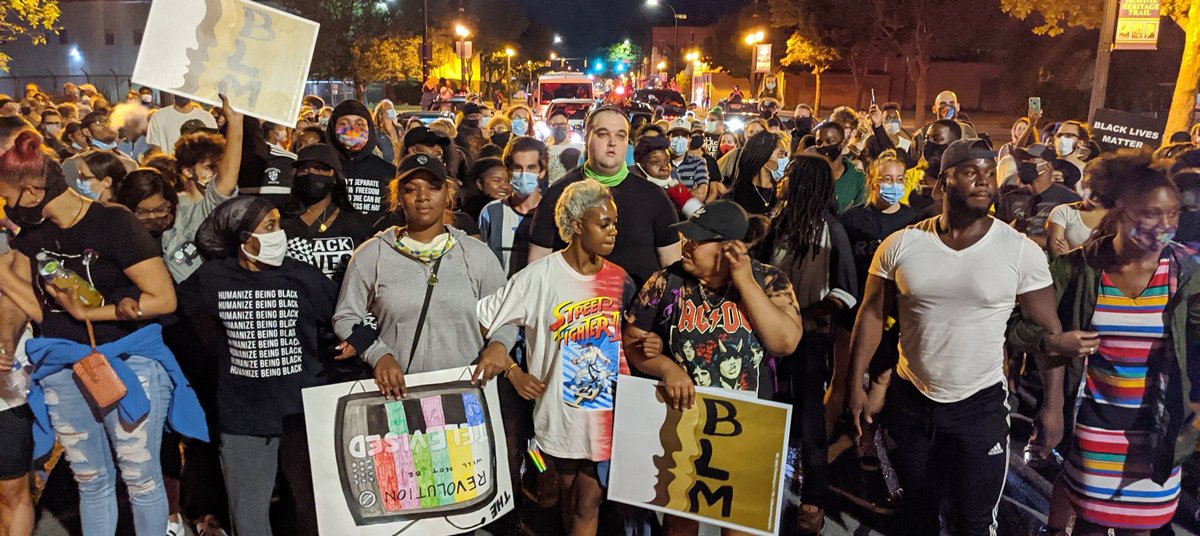
Memorial and march in Rochester, New York, September 3,
2020, for Daniel Prude who died in police custody in March 2020.
In the United States, the ruling circles and their elected representatives are going all out to undermine the growing movement for change. They are portraying those protesting for rights and against police violence and impunity as the source of conflict and violence which is, in fact, caused by the state. They also claim the way forward is by choosing sides in the November election or other reliance on the state machinery.
The people across the country are persisting in relying on their own initiatives and organising to defend rights, despite brutal police violence against them. To divert and disrupt the movement not only are elections presented as the solution but now state-backed racist militias are being deployed. This is not only used to incite violence against peaceful protesters, but also to justify using far greater state violence in the name of controlling "extremists" of the "right" and "left".
The unjustifiable racist police killings of African Americans continue with the latest such crimes in Rochester, New York and Los Angeles, California. The Rochester case only came to light because of efforts by the family demanding police video. Local police knew it was a homicide in March and New York's Attorney General has had the case since April - yet both kept the crime hidden. This has further exposed efforts by the states to quell resistance by claiming the solution to police killings is an "independent" investigation by the state attorney general. Hundreds immediately came out in protest in both Rochester and New York City and were met with a massive police presence and repeatedly sprayed with what police now call a "chemical irritant".
The level of brutality of the police forces everywhere - in Los Angeles again shooting an unarmed African American man in the back as he ran away and in Rochester suffocating another while he was naked, handcuffed, and on the ground in cold weather - make clear that these racist institutions are organised to impose submission to a system that protects property interests and generates fear, then presents such inhumanity as democratic and acceptable. The fear of the rulers that their "democracy" and "justice" are no longer being accepted is palpable. Their violence will not deter the resistance which is determined to prevail.
Use of Armed Militia
The use of armed militia with state backing and protection has been especially evident in Portland, Oregon and Kenosha, Wisconsin. In Kenosha, police did not arrest or disarm a young militia member from Illinois who shot and killed two people. He was only arrested at his home the following day. By comparison, organisers of the demonstrations were snatched off the street by local and federal forces in unmarked vans and held for 24 hours, charged with violating curfew.
Portland is one of the cities where state-backed efforts to discredit and criminalise protests, often using state-backed militias, has long occurred. The success of rights organisers there in making their demands for equality and against racist police violence and impunity heard and reckoned with, including daily protests now for nearly 100 days following the killing of George Floyd, is supported by tens of millions across the country. Demonstrators there have persisted undaunted despite vicious violence by local and state police as well as federal forces. Now, militias like Patriot Prayer, based in Washington State, and Proud Boys, also active in New York City, are increasingly being used.
Both commonly organise actions together, such as the recent August 29 "Trump Cruise" where dozens of vehicles were permitted by police and federal forces to caravan through downtown Portland, assaulting demonstrators by firing paint balls and pepper spray into the crowds. Police did not stop them, did not declare it unlawful when they diverted from their approved route, enabling them to reach the demonstrators. Demonstrators, on the other hand, in similar circumstances are routinely barricaded, charged with bicycles or police lines and tear gas.
In Portland, August 24, at a "No Marxism in America" rally by "Proud Boys", notorious for their violence and anti-people stands, an individual member of Proud Boys, with an arrest warrant out for previous assault on a demonstrator, was not stopped or arrested. Police knew of his presence, yet, as Police Chief Chuck Lovell put it, "What is it going to take for us to wade into a crowd of people to make an arrest on a warrant?" He added, "It's probably not something we'd look to do in that type of crowd control situation." Yet people here and worldwide have seen police and federal forces do exactly that night after night after night against people standing up for equality and an end to police violence. Further, there were only about 30 officers present at the "Proud Boys" rally, as compared to the hundreds of heavily armed officers commonly at the protests defending rights.
The militias involved are known for their violence against those standing up for rights and their openly Hitlerite, anti-Muslim, anti-immigrant actions. Both have been used to violently target demonstrators in Portland for more than two years. Their members are usually clothed in military style uniforms and their actions commonly guarded by Department of Homeland Security (DHS) officials. Numerous videos show them isolating and then beating protesters and assaulting them with paint balls and pepper balls. They are rarely arrested and police and federal forces usually do not intervene in the beatings, many severe enough to require hospitalization. Instead, they commonly tear gas and arrest the pro-people demonstrators.
In practice, these activities by police and militias exacerbate the policing issues facing the society. They are in part an effort to divert the movement into making these militias their main target, rather than the state that foments and protects them, while also increasing tensions among the people and justifying further state-organised violence by police or the military. Kenosha, for example, currently has more than 1,000 National Guard present.
At the August 29 confrontation with demonstrators in Portland by the armed militia forces, a member of "Patriot Prayer" was shot and killed. Reports indicate that Black Lives Matter protester Michael Forest Reinoehl responded in self-defence. He was from the Portland-area and a regular at the demonstrations. Unlike Kyle Rittenhouse, who killed two protesters in Kenosha and was only arrested the next day in a "routine" manner, Reinoehl was shot and killed in a hail of 30-40 bullets by US Marshals.
Further rallies by these armed militia are being promoted in Portland for September 7, 19 and 26. Governor Kate Brown has called on "outside agencies," like federal DHS and US Marshals, to assist. Oregon State Police will allow troopers responding to protests to be deputised by the Marshals so demonstrators can be charged with federal crimes, which often carry harsher sentences.
Los Angeles
Two Los Angeles County sheriff's deputies shot and killed 29-year-old African-American Dijon Kizzee on August 31. He was stopped while on his bicycle for what the police department called "bicycle code violations". He fled and was pursued, and a physical confrontation reportedly broke out. Police claim that Kizzee dropped some clothes and a firearm at this point, although none of the video of the incident can verify the firearm. However, it is clear he posed no threat. Police reports admit he was unarmed and fleeing. Police fired 15 times, killing him with shots to the back.
Attornies for Kizzee's family point out that police often use bicycle code violations as an excuse to justify a stop when a police shooting or other use of force has occurred. "That could be something as benign as riding his bicycle on the sidewalk or against traffic," said attorney Carl Douglas. "You never see anybody in Beverly Hills or Santa Monica stopped for a code violation."
Attorney Dale Galipo said Kizzee was shot in the back without any commands or verbal warning by police. "Another reckless, unnecessary shooting of a person of colour," he said. "One has to wonder: How long is this gonna go on? And why is it continuing to go on, day after day, week after week? How many families are watching right now concerned that their children, their loved ones are gonna be the next victims?"
Kenosha and Elections
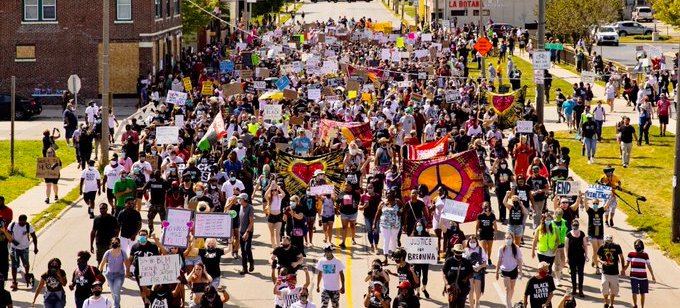
Protest in Kenosha, Wisconsin, August 29, 2020. Protests
have been ongoing since the police shooting of Jacob Blake.
Following the racist police shooting of Jacob Blake on August 23 and the killing of two protesters by an armed militia member on August 25, President Trump visited Kenosha, Wisconsin, on September 1. He did so despite a request from Governor Tony Evers, who publicly said his presence would "only hinder our healing" and "delay our work to overcome division and move forward together". Reports indicate that privately he also asked Democratic Presidential Nominee Joe Biden not to come, but he also visited Kenosha on September 3.
Protests against Trump's visit took place from the time he arrived in the early afternoon until the 7:00 pm curfew. There have been marches in Kenosha even before the police shooting of Jacob Blake and daily ones since. There have also been numerous community events, such as providing free food and medical supplies to further strengthen the unity and resistance.
To divert and dampen the ongoing actions in many cities, both Trump and Biden are trying to present the election as the "most important in modern history". People are supposed to divide for or against Trump and devote energy and resources on the candidates. Instead, people are organising to step up their resistance and already making plans for continued actions after the elections. They reject the old and obsolete "justice" of the existing system. The growing consciousness is that by sticking to their demands for equality and accountability and defending the rights of all, change that favours the people can be achieved.
In Kenosha, Trump took part in a "Community Safety Roundtable" where he began by praising the role of the police and military against demonstrations, which he termed as "anti-police and anti-American riots". He referred to demonstrators as "violent mobs", engaged in acts of "domestic terror". He said that the federal government is providing more funding for "hiring more police, surging tough-on-crime federal prosecutors, increasing penalties for assaulting law enforcement".
By defaming the movement as "terrorist", charges of domestic terror, or even those of "resisting arrest" if it involves federal officers, are going to be increasingly used against demonstrators to impose harsher sentences. This was further shown in Trump's remarks attempting to dismiss protesters and their just demands as followers of a violent ideology, specifically targeting those opposing fascism.
His exchanges in the roundtable focused on the destruction of property and the need to protect it, not people. He said he would provide emergency funding of $1 million for Kenosha police and another $42 million for statewide police forces and prosecutors.
US Attorney General Barr was also present. Like Trump, he emphasised continuing efforts by the federal government to control policing at the state and local level. For Kenosha, in particular, Barr said, "This is an example that when you have the local political leadership backing the police, you have the state willing to put in the resources in terms of National Guard, and the federal government able to come up with support such as the FBI, the Marshals, and ATF who have some special skills and forensic ability to help, there will be peace on the streets."
During his visit to Kenosha on September 3, Joe Biden, amongst other activities, took part in a community meeting and spoke by phone with Jacob Blake, still hospitalised and paralysed, and met with his family members. Trying to appear to support the cause of the demonstrators, he said that the police officer involved in the Blake shooting should be charged. But, his campaign clarified, only after "a full investigation to ensure all the facts are known first".
People in Rochester are well acquainted with such investigations by local and state officials, which hide yet another brutal "I Can't Breathe" killing of a black man. In the case of the individual who was only suspected of the August 29 fatal shooting in Portland of militia member Aaron J Danielson, there was no investigation; he was summarily gunned down and killed by federal forces.
"Full investigation", is reserved for agents of the state and whether conducted by local, state or federal officials, it is common to result in no charges. Though more than 1,000 police killings occur yearly, of the 42 non-federal police officers convicted between 2005 and 2020, only five were convicted of murder, 22 of various degrees of manslaughter, five of the lesser charges of negligent or reckless homicide. The rest were convicted for assault or lesser charges. (Statista Research Department, June 10, 2020).
Further, the broad resistance is demanding far more than just charges against individual police. The resistance is striving for new arrangements that provide justice by guaranteeing equal rights, provide the people with control, recognise that peace and security require dealing with poverty and state-organised violence, not denigrating protesters as the source of the problems.
The Trump and Biden visits and ongoing campaigns are part of the pressure from the ruling circles to divide the people and have them line up behind one or the other candidate. Instead, continuing actions in Kenosha, Portland, Los Angeles, Chicago and many other cities show the people are speaking out in their own name and organising to achieve their demands.
Sports Teams Join in Protests Following Shooting of Jacob Blake
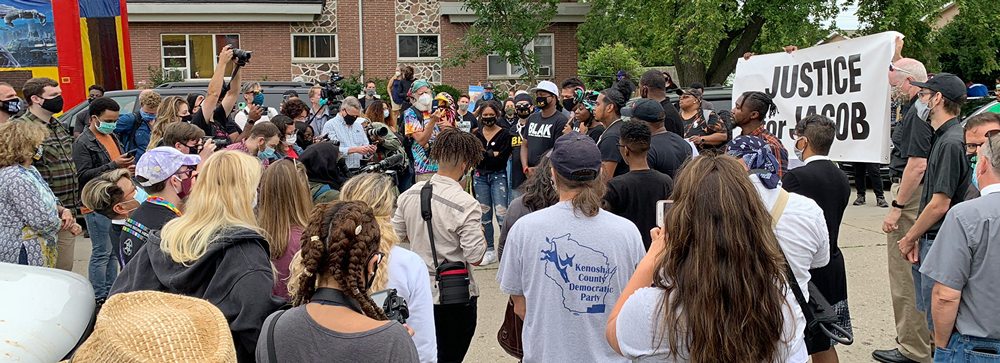
Community gathering in Kenosha organised by the Blake
family, September 1, 2020.
Since the police shooting of Jacob Blake, actions are being taken by professional athletes across North America in support of the Black Lives Matter movement against racism and police violence. On August 26, the Milwaukee Bucks led a historic boycott of the National Basketball Association (NBA) playoffs to protest against the escalation of racial violence in the country. Minutes before the game began, only the referees and athletes from the Orlando Magic were on the court. Orlando decided to walk off to join the boycott.
Strikes are banned under the NBA's collective bargaining agreement, which means the Bucks players broke their own contract in order to protest against racial injustice and police violence. The decision by the teams caused a chain reaction that included the Toronto Raptors, Houston Rockets, Oklahoma City Thunder, Los Angeles Lakers and Portland Trail Blazers, prompting action by the sport's top executives.
Teams from the Women's NBA, Major League Soccer and Major League Baseball, including the Milwaukee Brewers, have also joined the boycott, with athletes in the National Hockey League and professional tennis also holding similar actions. Many university and college sports teams also held protests and marches in solidarity across the US.
The stands taken by professional athletes against racism and police violence this year were preceded in recent times by then San Francisco 49ers quarterback Colin Kaepernick in 2016, who in that year's pre-season, began the practice of sitting or kneeling during the playing of the US National Anthem. He later explained, "I am not going to stand up to show pride in a flag for a country that oppresses black people and people of colour. To me, this is bigger than football and it would be selfish on my part to look the other way. There are bodies in the street and people getting paid leave and getting away with murder." His remarks came in the context of the growing Black Lives Matter movement following several outrageous police killings of African Americans.
Kaepernick's kneeling protest has since been picked up by many other players in the National Football League (NFL), while Kaepernick himself is said to have been blackballed and has not been signed to a team since 2016, despite being acknowledged as having the skills to be a starting quarterback. Monopoly media as well as President Trump have used this issue to try to sow divisions. Nonetheless, many ordinary youth taking part in amateur sport across the US, whether African American or not, have also taken up this form of protest to express their demand for an end to racism and police violence and to show their unity and refusal to be divided on a racist basis.
(TML Weekly, September 5, 2020)

Celebration in 2018 marking the 70th anniversary of the
founding of the Democratic People's Republic of Korea
September 9, 2020, marks the 72nd anniversary of the founding of the Democratic People's Republic of Korea (DPRK).
After decades of struggle against the Japanese occupiers (1910-1945), the Korean people, under the leadership of General Kim Il Sung and the Korean People's Army, liberated their nation on August 15, 1945, and began building a modern democratic state from the ruins of war. Across the country, People's Committees were formed and in August-September 1945 the Korean people elected their representatives to a People's Assembly, which proclaimed the "Korean People's Republic" on September 6, 1945.
However, the Republic was short-lived because the US insisted on fulfilling its ambition to establish a foothold in north-east Asia on the Korean Peninsula after the defeat of Japan, even though the Korean people freed themselves from the Japanese occupiers without the presence of any US troops. The US included a term in the surrender signed by Japan on September 2, 1945, that the Korean Peninsula would be divided along the 38th parallel and that the defeated Japanese military in Korea would surrender to US forces in the south, not to the Korean liberators. On September 8, 1945, two days after the declaration of the Republic, thousands of US troops began to arrive in Korea. The new occupiers declared the Korean People's Republic illegal and began to crush the People's Committees by force. In the words of US General Douglas MacArthur, Korea was to be an "anti-communist bulwark".
Over the next three bloody years, through a campaign of mass terror and brutality, the illegal US Military Government and their local agents criminalised, rounded up, tortured, imprisoned and murdered hundreds of thousands of suspected communists, "leftists" and other patriots who refused to submit to US dictate.
The US organised a fraudulent "free and fair" election in May 1948, which was boycotted en masse by the Korean people. The US installed Syngman Rhee as President of the Republic of Korea by force of arms in July 1948.
In response to this crime by the US against the Korean people and their drive for independence and reunification, Kim Il Sung declared the founding of the DPRK on September 9, 1948, in Pyongyang at a jubilant rally of more than one million people.
In order to capture the Korean Peninsula and use it to threaten aggression against China and the Soviet Union, in 1950 the US instigated the Korean War and from 1950 to 1953 more than four million Korean civilians were killed and massive destruction caused to the economy and infrastructure. The United States and 17 other countries, including Britain, took part in this war of aggression against the Korean nation under the fig-leaf of the UN flag on the false pretext of collective self-defence against an attack by the north on the south.
The US aggressors committed crimes against the peace, crimes against humanity and untold war crimes, including massacres of civilians, as well as the use of biological and chemical weapons and the fire-bombing of various northern cities, which resulted in many civilian casualties. The DPRK, though still in its infancy, with the help of the Chinese Volunteer Forces, organised the Korean people and defeated the US in the war and forced it to sign the Korean Armistice Agreement, thus defending the sovereignty and honour of the Korean nation.
DPRK President Kim Il Sung said at the time: "The victory of our people in the Korean War was a victory of the revolutionary people over the imperialist forces, a victory of the revolutionary army over the aggressive forces of imperialism. It proved that the people who rise up for freedom, independence and progress, taking their destiny into their own hands under the leadership of a Marxist-Leninist party, will never be conquered by any imperialist forces of aggression. It also exposed the vulnerability and corruptness of US imperialism, demonstrating to the oppressed nations of the world that US imperialism is by no means an unconquerable enemy and that they too can definitely fight and defeat it."
It is important to point out that the DPRK has committed no act of aggression against another country. The Korean War, which engulfed the entire Korean Peninsula, was provoked by the US and its puppet regime in the south. Standing firm against the might of the U.S. military empire - known for its use of nuclear, chemical and biological weapons worldwide - the DPRK affirms not only its right to be, but the right of all nations and peoples to self-determination and peace. For this internationalist spirit, the DPRK is justly admired by all justice- and peace-loving people in Britain and throughout the world.
Led by President Kim Il Sung, the exploits of the Korean people in the anti-Japanese war continue to inspire not only the Korean people, but the peoples of the world, to be courageous, fearless and self-reliant, that no matter the difficulties and the odds against them, they can prevail. President Kim Il Sung's far-sightedness and wisdom were tempered in the forge of anti-Japanese struggle, meeting the cruelty of the Japanese occupiers with total confidence in the Korean people and their abilities and determination.
Workers' Weekly condemns the hostility of successive British governments towards the DPRK, including the present one which faithfully submits to the US-inspired policy of sanctions and threats against the DPRK and its leadership with Kim Jong Un as Chairman of the Workers' Party of Korea, Chairman of the State Affairs Commission of the DPRK and Supreme Commander of the Korean People's Army. We wish the Korean people every success in their striving to secure peace for their nation and put an end to more than 70 years of US-engineered division, tension and strife and to move forward as a united, peaceful and prosperous country.
Receive Workers'
Weekly E-mail Edition: It
is free to subscribe to the e-mail edition
We encourage all those who support the work of RCPB(ML) to also support it
financially:
Donate to
RCPB(ML)
Workers' Weekly is the weekly on
line newspaper of the
Revolutionary Communist Party of Britain (Marxist-Leninist)
Website:
http://www.rcpbml.org.uk
E-mail:
office@rcpbml.org.uk
170, Wandsworth Road, London, SW8 2LA.
Phone: 020 7627 0599: